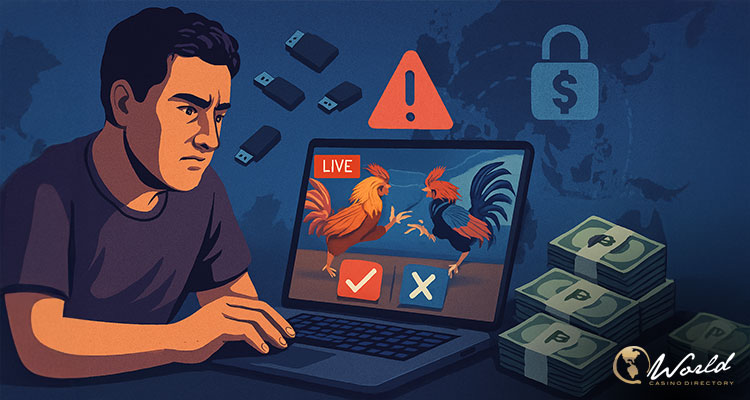A recent report by sociocultural research firm The Fourth Wall has found that online cockfighting, or e-sabong, remains widely accessible in the Philippines despite being prohibited since December 2022. The nationwide suspension, ordered by President Ferdinand Marcos Jr. under Executive Order No. 9, halted all online, remote, and off-cockpit betting on live cockfights, as well as any livestreaming of such matches outside official venues.
Key Differences Between Licensed and Unregulated Platforms
The study reveals that multiple unregulated gambling sites continue to host e-sabong events and openly promote them through social media platforms such as Facebook, using dedicated groups and private messaging channels. While some platforms require users to register accounts before playing, promotional content is still freely circulated, suggesting both high demand and the adaptability of illegal operators.
“Our latest report demonstrates how prohibited games like e-sabong remain easily accessible on unregulated platforms even to high-profile figures, underscoring persistent enforcement challenges,” said John Brylle L. Bae, Research Director at The Fourth Wall.
The Fourth Wall compared PAGCOR-licensed operators—including BingoPlus, PlayTime, CasinoPlus, ArenaPlus, Bet88, OKBet, and 747 Live—with unregulated platforms such as JOLIBET, OKEBET, PHDream, PHFun, PH365, Betso88, 1xBet, and Jili77. The study found that unlicensed platforms offer an average of 5,000 games—around 72% more than the 2,900 games available on regulated sites.
Licensed operators are required to submit new titles for PAGCOR approval and third-party testing, ensuring compliance and fairness. Unregulated platforms bypass these processes entirely, releasing games without verification and exposing players to potentially manipulated or counterfeit content.
According to Philippine Daily Inquirer, the study also noted that unregulated operators aggressively market higher-value sign-up offers, sometimes up to 108%, along with cashback and rebate incentives that surpass those on regulated sites. These benefits, coupled with fewer restrictions, are used to attract and retain players.
Limited Safeguards and Player Risks
One of the most notable differences is in player verification. Regulated sites display a PAGCOR-branded pop-up during registration, requiring government-issued IDs, age checks, and, in some cases, cross-referencing with e-wallet account details. This system is designed to prevent underage participation and enhance player protection.
In contrast, many unregulated platforms impose minimal or no “know-your-customer” (KYC) requirements, sometimes asking only for an email address or phone number. This lack of oversight has reportedly led to instances of minors engaging in gambling, with some cases involving debt accumulation, exposure to scams, and privacy breaches through spam messages.
Payment methods also differ significantly. Regulated operators accept widely used e-wallets like GCash, Maya, and QRPH, as well as bank transfers, but apply transaction caps to comply with anti-money laundering rules. Unregulated platforms often allow unlimited payments, which the report warns can facilitate excessive losses.
The research comes amid renewed national debate over the future of online gambling in the Philippines, with policymakers weighing a complete ban against tighter regulation. The continued prevalence of e-sabong on illicit platforms underscores the challenges of enforcement in an evolving digital landscape.


